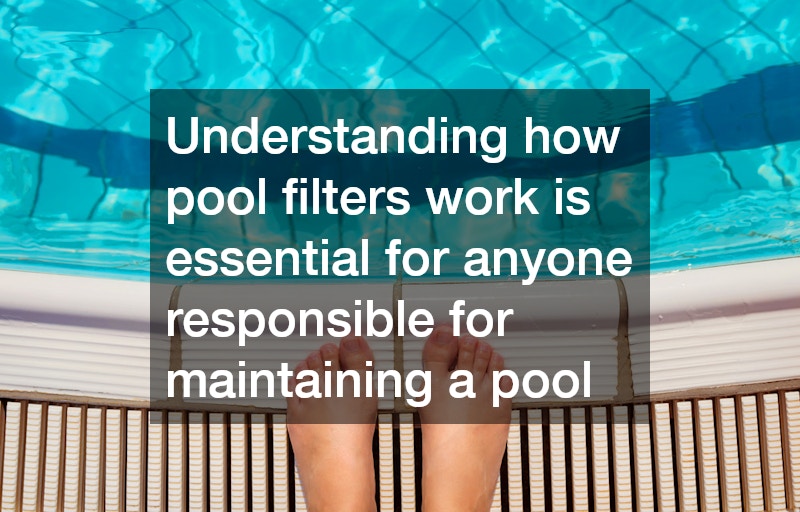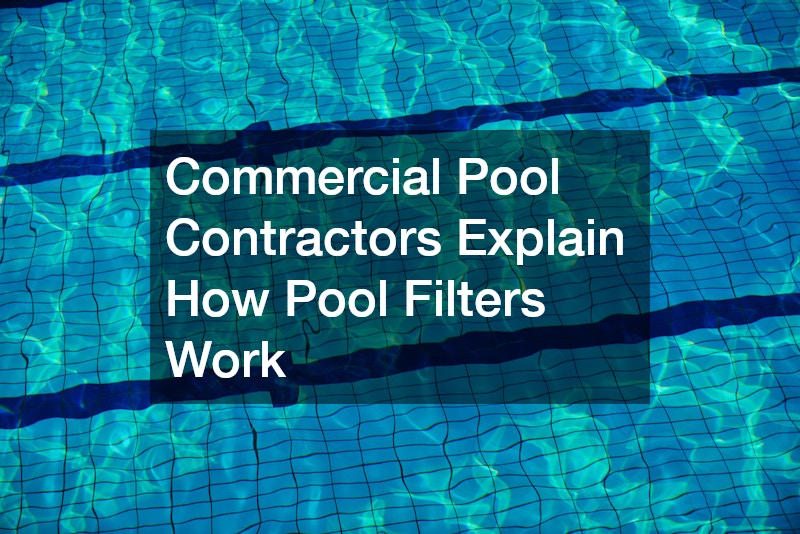When it comes to maintaining a clean, safe, and inviting swimming pool, the filtration system plays a pivotal role. Pool filters are integral components that keep the water clear by removing dirt, debris, and contaminants. Whether you’re managing a private backyard pool or a commercial facility, understanding how pool filters work can help you make informed decisions about maintenance, water quality, and longevity. In this article, commercial pool contractors explain the mechanics of pool filters and why regular upkeep is essential for the efficiency of your pool.
The Basics of Pool Filtration
At the core of any swimming pool system is the filtration process, which involves circulating water through a filter to remove unwanted particles. Pool water is continuously circulated via the pump, and during this process, it passes through the filter.
The filter works by trapping dirt, debris, oils, and microscopic particles, ensuring that only clean water is returned to the pool.
There are several types of pool filters, but all function with the same basic principle: removing contaminants from the water. The three primary types of pool filters used in both residential and commercial pools are sand filters, cartridge filters, and DE (diatomaceous earth) filters. Each filter type has its own advantages, and commercial pool contractors typically select the one that best fits the size and needs of the pool.
Sand Filters
Sand filters are one of the most common and affordable options for pool filtration. They use a bed of specially graded sand to trap dirt and debris. As water flows through the sand, the grains act like tiny sieves, catching particles that are too large to pass through. The clean water then exits the filter and returns to the pool. Over time, the trapped debris can build up, so sand filters require periodic backwashing to remove the dirt and clean the sand.
One of the benefits of sand filters is that they are relatively low-maintenance and easy to operate. However, they have a limitation in that they can only filter out larger particles, usually those that are about 20 microns in size. Commercial pool contractors often recommend sand filters for smaller commercial pools or those that do not have heavy usage.
Cartridge Filters
Cartridge filters are another popular option for pool filtration. These filters consist of one or more pleated fabric cartridges that trap dirt and debris. The water is forced through the cartridges, and the contaminants are caught by the fibers. Once the water passes through the cartridge, it is returned to the pool, leaving behind cleaner, clearer water.
Cartridge filters are known for their ability to trap smaller particles than sand filters, often down to 10 to 15 microns. This makes them more effective at keeping pool water exceptionally clear. Additionally, cartridge filters require less maintenance than sand filters because they do not require backwashing. Instead, they need to be removed and cleaned with a hose or replaced entirely once the cartridges become too clogged.
For commercial pools, cartridge filters are often the go-to choice, especially when water quality is a priority and the pool sees frequent use. Their higher efficiency in trapping smaller particles can ensure that the pool water remains pristine, even in high-traffic environments like hotels, gyms, or water parks.
Diatomaceous Earth (DE) Filters
Diatomaceous Earth filters offer the highest level of filtration, trapping particles as small as 2 to 5 microns. These filters use a fine powder made from the fossilized remains of diatoms (tiny aquatic organisms). When the DE powder is applied to the filter grids, it forms a layer that captures dirt, debris, and other impurities as water passes through. DE filters are highly effective at producing crystal-clear water, which is why they are often used in commercial pools where water clarity is a top priority.
However, DE filters do come with more maintenance requirements than sand or cartridge filters. They need to be cleaned regularly, and the DE powder must be replenished after each cleaning or backwashing. Despite the added effort, the superior filtration capabilities of DE filters make them a favored choice for many commercial pool contractors, especially in facilities with high customer volume.
Conclusion
Understanding how pool filters work is essential for anyone responsible for maintaining a pool, whether it’s a residential backyard pool or a large commercial facility. Commercial pool contractors can help guide pool owners through the selection and maintenance process, ensuring that the filtration system is working efficiently. Regular care of your pool filter is crucial to ensure clean, clear, and safe water, keeping both guests and swimmers happy. By choosing the right filter, performing regular maintenance, and partnering with skilled professionals, you can enjoy a pristine pool year-round.
.


